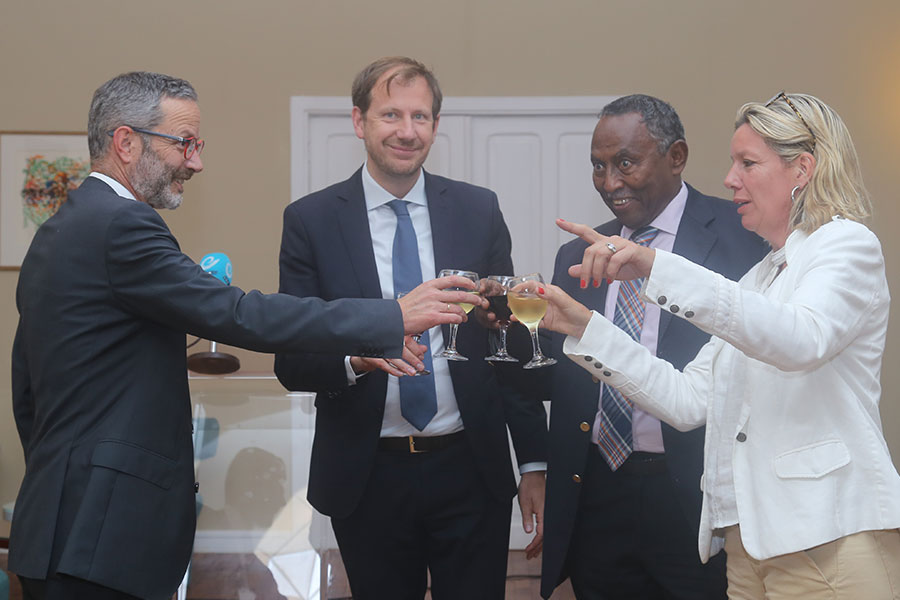
Viewpoints | Jan 15,2022
May 31 , 2020
By Dawit Wondimagegn
The World Health Organisation's (WHO) relevance, effectiveness and clout have always been a source of debate in the global health field. For those of us working in the health system of developing nations, the importance of such a global health body has never been in doubt, writes Dawit Wondimagegn (MD) (dawitwondimagegn@gmail.com), associate professor of psychiatry at Addis Abeba University’s School of Medicine and chief executive director of Tikur Anbessa Hospital.
Controversies are engulfing the global response toward the Novel Coronavirus (COVID-19) pandemic. Threats and counter-threats of support for the World Health Organisation (WHO), the agency mandated to look after the health of the globe, have dominated the news for some time. We will probably continue to hear about it for the foreseeable future, at least until the United States’ upcoming presidential election.
The WHO’s relevance, effectiveness and clout have always been a source of debate in the global health field. For those of us in the health system, this is not new, and it will continue to divide opinion depending on where one is on the globe.
For those that work in the health systems of low and middle-income countries, the WHO remains a source of much-needed guidance, knowledge and resources to tackle both local and global health issues. Developing nations rely heavily on the organisation to implement their national health policies.
On the other side of the divide, in the developed countries the WHO has little significance in guiding the operations of health systems. Coupled with a rigid bureaucracy and an increasingly troublesome budget, a new debate has been sparked over its effectiveness.
A global pandemic was always going to put these inherent frailties of the organisation in the spotlight. The COVID-19 pandemic is now serving as the script for global powers to showcase where they stand and what they can do in terms of carrying out their global responsibilities. The decision by the US to hold back its funding is one example of how a powerful nation could take away significant portions of funding and put the lives of millions of people in the developing world in danger.
One can only imagine the consequences of interrupting even for a short time the funding that goes into combating diseases that affect women and children, HIV/AIDS and tuberculosis. For many of us who have lived through the devastation AIDS has caused to the poor of the world, there is no need for imagination. Memory serves us very well.
The other side of this story is, of course, the counter-narrative. As soon as the US announced its decision to withhold funding until the WHO complies with its demands, China swiftly pledged an additional 30 million dollars for the Organisation – a move that was as commendable as it was intriguing. We will never know if China is moving to position itself as a potential candidate to fill the void that will be left in case the US delivers on its threat to leave the WHO.
But why would two powerful nations fight over crucial funding needed to combat a world pandemic to the world’s only international health organisation?
This has to do with global health politics. In the relatively pure mind of many citizens, health is a sacred state of being - a good that needs to be cherished and protected from the evil hands of politics. It is considered a right that needs to be respected like all the other benefits we believe are entitled to anyone by virtue of being human.
However, these same qualities make health a commodity too - something one can have and something that can be given and denied. It is these characteristics that make health a focal point for politics. Health is socially determined, and the social is almost always determined by politics, rendering health a political tool at a national level.
However, as the movement of people has increased over the years with the advent of globalisation, a new paradigm emerged for health at the global stage. When people move, they move with their illnesses and vulnerabilities. This means the entire world becomes one big risk zone for ailments from other faraway lands. This forced nations to come together and decide what kind of policy they should follow to deal with the health of people around the globe and eventually made health one of the pillars of the global security agenda.
Countries adopted one of two policy approaches in determining their role in global health issues. They either opted for cooperation or an isolationist policy. In the former, global health issues are generally taken as challenges to humankind. This attitude perceives national health systems. When global health problems like pandemics arise, the rest do not sit and watch. They act in unison, and they all commit to a shared health governance in policymaking. This approach to policy gives the WHO a lot of power and the mandate to govern global health issues to help reduce global health inequality.
For the most part, it has led to success in eliminating or at least containing pestilences that threatened the world in the past, such as smallpox, tuberculosis, malaria and HIV/AIDS. However, there is still a long way to go to bridge the equity gap between poor and rich countries. This approach has also not been without its disadvantages, especially since it has made developing nations dependent on rich nations for even some of the most basic healthcare needs of their citizens.
An isolationist policy takes global health to be a private endeavour, and each nation stands on its own. Global health issues are regarded as threats rather than common challenges. Local health policymaking tends to focus on protecting the country from global health problems, and health becomes a matter of sovereignty. In this approach, an organisation such as the WHO will struggle to maintain a suitable influence on global health issues.
Most countries have oscillated between the two approaches in response to specific global health issues. For instance, the United States has championed the cooperative approach several times in the past, especially in its response to the HIV/AIDS pandemic. Through the President’s Emergency Plan for AIDS Relief (PEPFAR) funding, the US helped save millions of lives in Africa and the developing world. It still does.
This is why the switch of the United States to an isolationist health policy in the middle of the COVID-19 pandemic caught everyone off guard. Pandemics are times to cooperate, because there is simply no other choice. It requires effort and humility for each nation to do its share to the best of its ability for the world to survive as a whole. A cut in funding for the WHO will lead to the death and suffering of millions of lives in the developing world.
The scar this leaves behind will be recorded by history in a similar way to colonialism, as a moment when part of the world abandoned the poor, while the rest stood by with indifference.
Irrespective of its intentions, China and the United Kingdom seem to have taken note; and, at this juncture, intentions do not matter but controlling this pandemic does. Other countries should also take note and be counted so that the poor of the world do not pay with their lives, while the two giants of the world duke it out for dominance. This may sound naive, but that is precisely what the world needs right now: a bit of naiveté to embrace the other, to consider the other as a mirror of oneself and to assume the risk together.
The remedy for the huge gap in global health equity depends not only on adopting a cooperative approach but also on each country’s response and investment in its own health sector. African countries and their governments have forgotten to invest in their health systems for such a long time that they have taken global cooperation for granted.
If this controversy surrounding the WHO is not a lesson for us to start to develop an independent health system, we are doomed to remain with our colonised minds. We will be the dependents and the victims while the elephants fight.
PUBLISHED ON
May 31,2020 [ VOL
21 , NO
1049]


Covid-19 | Mar 31,2020

Radar | Nov 05,2022

Editorial | Jul 25,2020

Fortune News | Jun 17,2023

Fortune News | Nov 09,2019

My Opinion | 132038 Views | Aug 14,2021

My Opinion | 128435 Views | Aug 21,2021

My Opinion | 126362 Views | Sep 10,2021

My Opinion | 123981 Views | Aug 07,2021





Dec 22 , 2024 . By TIZITA SHEWAFERAW
Charged with transforming colossal state-owned enterprises into modern and competitiv...

Aug 18 , 2024 . By AKSAH ITALO
Although predictable Yonas Zerihun's job in the ride-hailing service is not immune to...

Jul 28 , 2024 . By TIZITA SHEWAFERAW
Unhabitual, perhaps too many, Samuel Gebreyohannes, 38, used to occasionally enjoy a couple of beers at breakfast. However, he recently swit...

Jul 13 , 2024 . By AKSAH ITALO
Investors who rely on tractors, trucks, and field vehicles for commuting, transporting commodities, and f...

Jul 12 , 2025
Political leaders and their policy advisors often promise great leaps forward, yet th...

Jul 5 , 2025
Six years ago, Ethiopia was the darling of international liberal commentators. A year...

Jun 28 , 2025
Meseret Damtie, the assertive auditor general, has never been shy about naming names...

Jun 21 , 2025
A well-worn adage says, “Budget is not destiny, but it is direction.” Examining t...

Jul 13 , 2025 . By YITBAREK GETACHEW
The Addis Abeba City Revenue Bureau has introduced a new directive set to reshape how...

Jul 13 , 2025 . By BEZAWIT HULUAGER
Addis Abeba has approved a record 350 billion Br budget for the 2025/26 fiscal year,...

Jul 13 , 2025 . By RUTH BERHANU
The Addis Abeba Revenue Bureau has scrapped a value-added tax (VAT) on unprocessed ve...

Jul 13 , 2025 . By NAHOM AYELE
Federal lawmakers have finally brought closure to a protracted and contentious tax de...